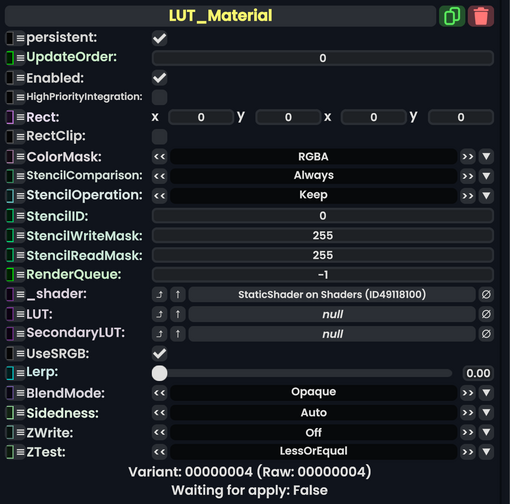
An LUT or Lookup Table is a way of mapping input values to output values via sampling a 3D Texture. This 3D table of values allows for any arbitrary function to be applied to an input.
How the sampling works is that it takes a color behind it (for example, a magenta color) and maps it's RGB values to a 0-1 Float3 as XYZ, it then samples the provided 3D texture at point XYZ multipled by the texture's size, and uses the pixel's color as the result which is applied to what the user sees through this material.
For more info on how pixels are arranged on a 3D texture and can be retrieved using an Int3, see 3D Texture.
Fields
| Name | Type | Description |
|---|---|---|
persistent
|
Bool | Determines whether or not this item will be saved to the server. |
UpdateOrder
|
Int | Controls the order in which this component is updated. |
Enabled
|
Bool | Controls whether or not this component is enabled. Some components stop their functionality when this field is disabled, but some don't. |
HighPriorityIntegration
|
Bool | If true, integrating this asset (e.g. processing procedural assets) gets higher priority than assets with this flag off. An example is user laser procedural meshes. |
Rect
|
Rect | |
RectClip
|
Bool | |
ColorMask
|
ColorMask | The color channels to affect |
StencilComparison
|
StencilComparison | See Type:StencilComparison for an in depth explanation on what this does. |
StencilOperation
|
StencilOperation | See Type:StencilOperation for an in depth explanation on what this does. |
StencilID
|
Byte | The Stencil ID of this material. This is sometimes written to the frame buffer's Stencil mask, or used to determine whether this material should render for a particular pixel. |
StencilWriteMask
|
Byte | does a Bitwise AND with this number for every pixel in the frame buffer this is rendering on top of when this object is drawn, after reading from the buffer. |
StencilReadMask
|
Byte | is bitwise ANDed with the Stencil in the frame buffer before the test compares them. |
RenderQueue
|
Int | changes at which point a material renders on the render stack |
_shader
|
Shader | Internal. |
LUT
|
Texture3D | The 3D texture to use as a lookup table |
SecondaryLUT
|
Texture3D | A secondary 3D texture to use to lerp between |
UseSRGB
|
Bool | Whether to use the SRGB color space when spitting out colors. |
Lerp
|
Float | Allows blending from the first LUT (0) or the secondary LUT (1) |
BlendMode
|
BlendMode | How to blend this material's colors vs what it rendered on top of. |
Sidedness
|
Sidedness | Render on both sides of the mesh, front, or back. |
ZWrite
|
ZWrite | whether this material should respect the distance it is from the camera. |
ZTest
|
ZTest | Determines whether this object should render when it is in front of or behind other objects that respect depth from the camera |
Usage
The mapping function of an LUT takes an input RGB value and then samples the 3D Texture at that corresponding coordinate to find the output RGB value, using the 3D Texture's Filter Mode and Wrap Mode to resolve how intermediate values work.
Examples
We need (an image of a scene behind a plane as well as the cube of the 3d texture being used):
- an example of an LUT material making a Gameboy effect of materials behind it
- an example of an LUT making a grayscale effect of materials behind it
- an example of an LUT that inverts materials behind it
- an example of an LUT that makes materials behind it that have shades of red in their surface spit out random nonsensical colors depending on brightness (yes this is possible with an LUT)